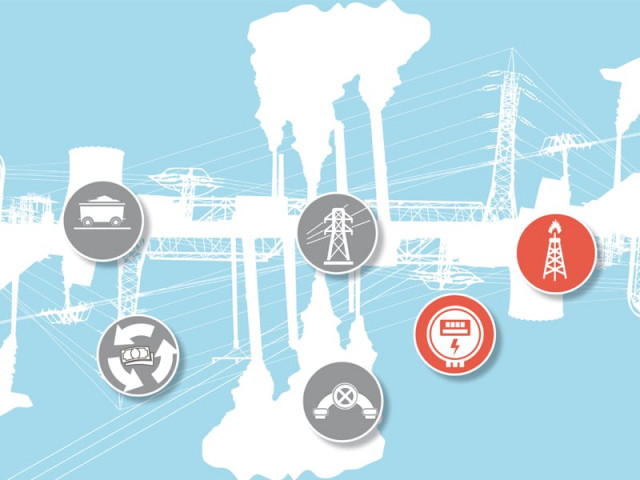Regional energy trade to bridge demand-supply gap
With support from international institutions, it is time to show progress.

Pakistan should remain committed to regional energy trade agreements in order to deepen trade ties with the stakeholders. PHOTO: FILE
Energy is the fuel for economic growth and an essential requirement for social development. However, its persistent shortage has been a major factor in restricting the growth of the region.
Economies of Pakistan and India have grown at the rate of 3.6% (2012-13) and 5% (2012-13) respectively. Afghanistan’s economic growth is expected to slow down sharply to 3.1% this year and 3.5% in 2014 compared to 14.4% in 2012 due to scheduled pullout of foreign forces and squeezed foreign aid, revealed a World Bank report.
Many studies show that by addressing energy shortages, each of these countries could achieve a 3-4% higher growth rate.
By the middle of this century, energy demand would certainly more than double as the world population grows rapidly and developing countries expand their economies. All energy forecasts show that the world will rely on coal, oil and gas for decades to come.
To meet the growing energy demand, linking energy suppliers in Central Asia with consumers in South Asia can be the answer. Both the regions can reap maximum dividends from energy trade, which can also play a constructive role in future development of the regions.
A recent Inter-governmental Council (IGC) resolution signed by Central Asian and South Asian states for CASA-1,000 power supply project is the beginning of cooperation between the regions. The agreement, signed by Kyrgyzstan and Tajikistan from Central Asia and Pakistan and Afghanistan from South Asia, will lead to an investment of $1 billion in a bid to ease power shortages in Pakistan and Afghanistan while enhancing revenues for the exporting Central Asian states.
Pakistan, Afghanistan, Iran and India now have greater opportunity to tackle energy shortages by cooperating with one another and pressing on with projects like TAPI (Turkmenistan, Afghanistan, Pakistan and India) and IP (Iran-Pakistan) gas pipelines.
However, difficult security situation in Afghanistan, international sanctions on Iran and political standoff between Pakistan and India have impeded the progress on regional energy trade moves.
Pakistan should remain committed to regional energy trade agreements in order to deepen trade ties with the stakeholders. For that, Pakistan is playing a significant role in the Afghan peace process. A peaceful, stable and prosperous Afghanistan is in Pakistan’s vital national interest.
Afghanistan serves as a link with the energy-rich Central Asian region. Keeping in view its geostrategic importance, Afghanistan can play a vital role as a transit corridor from Central Asia to major energy consuming centres in South Asia.
Cooperation between Central and South Asia would pave the way for peace and prosperity in both regions. Energy trade can lead to resolution of conflicts between countries, which may also improve the security situation by providing economic incentives to the populace.
However, investment is the key to building energy infrastructure and institutional development which in turn leads to energy security, growth and development. In this regard, private sector investment is also crucial to take the projects to the next stage.
Both the regions should now frame strategies for meeting the needs of energy-deficit countries by energy-surplus nations. Putting in place an institutional framework by the public sector and its implementation is an important first step.
The writer is a public policy analyst and consultant at the Sustainable Development Policy Institute, Islamabad
Published in The Express Tribune, November 18th, 2013.
Like Business on Facebook, follow @TribuneBiz on Twitter to stay informed and join in the conversation.



















COMMENTS
Comments are moderated and generally will be posted if they are on-topic and not abusive.
For more information, please see our Comments FAQ